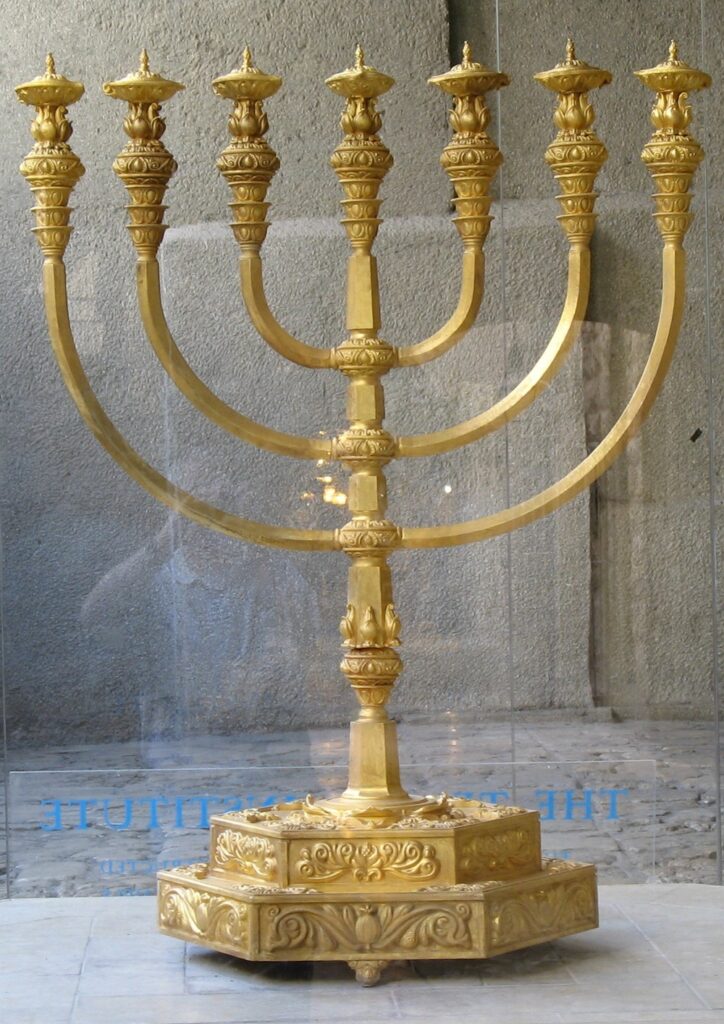And Adonai came in and stood and called over and over, “Samuel! Samuel!” And Samuel said, “Speak for your servant is listening.”
1 Samuel 3:10
1 And the boy Samuel served Adonai before Eli, and the Word of Adonai was rare in those days, there was no vision breaking through.
This chapter opens by calling Samuel a serving boy, this is the fourth verse to do so, once again comparing him to Eli’s wicked sons in the previous chapter.
It seems strange that this verse says that “the Word of Adonai was rare,” when in just the last chapter a prophet showed up with a vision and a word from the Lord. This rareness seems to be tired to the general state of Israel during the time of the Judges, where the people repeatedly “did what was evil in the sight of Adonai” The people did not seek out God, and in the entire book of Judges only two prophets are mentioned.
The wording describing the lack of vision is interesting. Most translations will say something along the lines of “vision was not widespread.” However, the Hebrew for “widespread” here is the word nifratz, which comes from the root paratz, which means “to break something” or “make an opening.” The idea is that visions and prophecies were blocked by something, most likely the lack of regard for the Lord, and they were not “breaking through” to the people like they should have been. In other words, prophecy and visions were rare because of the hardness of heart of the Israelites.
2 And it was in that day, that Eli was lying in his place, and his eyes had begun to weaken, he was unable to see.
In fulfillment of the previous chapter’s prophecy, Eli’s eyes are growing weak. Weak eyes, or blindness, came to represent corruption in Jewish traditions. The idea is that people who “turn a blind eye” to wickedness because of a bribe of some sort, are punished by becoming blind. So with that in mind, Eli has failed to do enough to rebuke his children, and he is now becoming blind as a result.
3 And the lamp of God had not yet gone out, and Samuel was lying in the Temple of Adonai, which is where the Ark of God was.
The “lamp of God” would be the golden menorah that sat inside the Tabernacle, and would have been lit in the evening, and then put out in the morning (Exodus 27:21). Samuel is probably resting here, inside the Holy Place, near the Holy of Holies, as it is his duty that night to make sure the lights on the lamp do not go out until dawn. This is interesting, because Samuel is not technically a priest and as such should not be allowed inside the tabernacle at all. Perhaps Eli, after receiving the prophecy about his sons, has given Samuel, who serves the Lord well, duties that normally would be done by the priests.
4 And Adonai called to Samuel, and he said “Here I am.” 5. And he ran to Eli, and said, “Here I am, for you called to me.” And he said, “I did not call, return and lie down.” And he went and lay down.
Samuel is lying in the Holy Place, right outside of the Holy of Holies, which is where God was said to dwell with Israel. And God speaks to him, but at first, he confuses the voice of God with the voice of Eli. Since Eli has gone blind, Samuel is probably used to having Eli call for him in the middle of the night to help him, and so the confusion may be a natural one.
6 And Adonai continued to call again, “Samuel!” And Samuel got up and went to Eli and said, “Here I am for you called to me.” And he said, “I did not call, my son, return and lie down.” 7 And Samuel did not yet know Adonai, for the Word of Adonai had not yet been revealed to him.
God calls to Samuel as second time, and again Samuel thinks that it is Eli. Samuel has never heard the voice of the Lord before, so he does not know that God is calling to him.
8 Adonai continued to call “Samuel” a third time. And he got up and went to Eli and said, “Here I am for you called to me.” And Eli understood that Adonai was calling to the boy.
The third time, Eli realizes that Samuel must be hearing God, and not just imagining it.
9 And Eli said to Samuel, “Go and lie down, and if it happens that he calls to you, then say, ‘speak Adonai for your servant is listening.'” And Samuel went and lay down in his place.
Eli tells Samuel to wait for the Lord to call him again, and then respond. He tells Samuel to respond by using the name of the Lord, that is, the actual name of God, transcribed: YHWH.
This is something we miss in most English translations because we replace the name of God with “Lord” (sometimes in all caps) in almost every translation. This follows the tradition of the Jews is replacing the name of God with Adonai, the Hebrew word for “my lord,” this is done to avoid taking the Lord’s name in vain and breaking the third commandment. You may have noticed that in my translation I replace the name of the Lord with “Adonai,” for this same reason while also trying to differentiate between the times the name of God is used, from the times when people just say “lord” when referring to a human authority.
10 And Adonai came in and stood and called over and over, “Samuel! Samuel!” And Samuel said, “Speak for your servant is listening.”
God calls to Samuel a fourth time, calling his name twice. The text suggests that this time, God appears visibly to Samuel, coming into the Tabernacle and standing before him.
Samuel answers as Eli suggested, except he forgets to address the Lord by name.
11 And Adonai said to Samuel, “Behold I am about to do a thing in Israel, that will ring the two ears of all who hear. 12 In that day I will fulfill all that I spoke to Eli of his house, beginning and ending. 13 and I declare to him that I judged his house until eternity, in the iniquity that he knew, for his sons were cursing themselves, and he did not rebuke them.
God’s first message to Samuel serves a couple purposes. The primary purpose is an affirmation of the previous prophecy against Eli and his sons. This time God provides a bit more context for why Eli is judged as well as his sons, because Eli knew of his son’s wickedness and did not stop them. In modern terms he is an accessory to the crime. Since Samuel is receiving this message, it also serves as a warning to him to start distancing himself from Eli.
14 “And thus I swear to the house of Eli, the iniquity of the house of Eli will not be atoned for in sacrifice or in food offering until eternity.”
God’s punishment is decided, and no amount of sacrifice will cover over the sins of Eli’s sons. The Hebrew phrasing here is odd, saying literally, “If the iniquity of the house of Eli will be atoned for in sacrifice…” almost as though there is still a chance that sacrifice could save them. However, open-ended Hebrew phrases that start with “if” sometimes are used idiomatically as a way of saying “there is no chance,” almost as though it were saying, “if there was a way for this to work… I do not know it.”
15 And Samuel lay down until morning. And he opened the doors of the house of Adonai. And Samuel was afraid to reveal the vision to Eli.
Samuel gets up and starts going about his duties, purposefully avoiding Eli because of his vision.
16 And Eli called Samuel and said, “Samuel, my son.” And he said, “Here I am.”
Eli eventually does call to Samuel, and Samuel responds to Eli the way he always does.
17 And he said, “What was the word that he spoke to you? Please do not conceal it from me. So may God do to you and more if you conceal from me a word from all the words that he spoke to you.”
Eli wants to know what God said, and even swears an oath. “May God do to you and more…” is a common oath/curse of the time period, and is used often in the Biblical text. The idea is that in certain matters people can call on God to enforce a certain outcome, those who refused the oath would be punished by God.
18 And Samuel revealed to him all the words, and he did not conceal them from him. And he said “He is Adonai, let him do what is good in his eyes.”
Samuel does tell Eli of the vision, and God’s message to him. Eli takes it as well as he could, recognizing that God’s judgement is beyond his authority to change.
19 And Samuel grew and Adonai was with him, and he did not let any of his words fall to the earth.
The phrase used here “he did not let any of his words fall to the ground,” is a way of saying, “he did not allow any of his words go to waste,” or “fall on deaf ears.” God is lifting up Samuel’s words, and all of them have purpose and power behind them.
20 And all Israel knew, from Dan to Beer-Sheba, that Samuel was proved to be a prophet of Adonai. 21 And Adonai continued to appear in Shiloh, and Adonai was revealed to Samuel in Shiloh, in the Word of Adonai.
Samuel’s words being upheld by God proves to Israel that he is a prophet. The cities of Dan and Beer-Sheba, sit on the northern and southern edges of the historical land of Israel respectively. By saying “from Dan to Beer-Sheba” the text refers to everyone in the land between the cities.
God repeatedly reveals himself, via the “Word of Adonai,” to Samuel at Shiloh. Samuel is effectively acting as the voice of God in the Tabernacle, even while God is preparing to remove the current priesthood.
The phrase “Word of Adonai” or “Word of the Lord” is very interesting in light of John 1, where Jesus is called “the Word.” If this does refer to a pre-incarnate Jesus, “the Word” appearing to Samuel, then we can assume that God visibly appears to Samuel. This fits with the language surrounding Samuel’s calling, which was called a vision.



